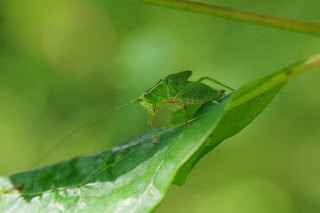Starting with Backyard Bug of the Day:
This is a new species of katydid for me. I thought it was a tree cricket when I first spotted it, from the size of it and the color, but when I actually got close enough to look I could see that it's a katydid.
Now, for more Orthopterans:
One fun way to find crickets and katydids: when they hide, sometimes their antennae stick out.
Here's the rest of that cricket.
Katydid
Cricket
Here's three different crickets within inches of each other in the rock garden:
No wonder it's so lout out there when I open the window at night.
A closer look at the three of them:
After finding several katydids and crickets, I actually went looking for a grasshopper to complete the set of Orthopterans (although it wasn't really complete. I saw some katydids and crickets that I didn't get pictures of. They hop too well). I knew that I would be able to find a grasshopper in the rock garden, because this time of year there are always some there, and I was right, there were a lot of them there. I had a hard time getting a picture, though, because they kept hopping away. Also, there are some weeds in the rock garden that were obstructing my shot, so I pulled a few out. When I did, I noticed that the creeping myrtle, the ground cover in that garden, kept moving in the spot where I pulled them; obviously it shook the plants when I pulled the weeds, but they kept shaking... like something was moving underneath them... and I have enough experience with my backyard to recognize certain things, and it looked to me like there was a snake moving under there... I looked at where the movement continued, and caught a glimpse of the snake. It was one I have not seen before, although I didn't see very much of it at all I could tell that. And then it disappeared. I must have been practically standing on it, and pulled the weeds right next to where it was. That unnerved me a little... But I still managed to find and photograph a grasshopper. I didn't pull anymore weeds, though.
Meanwhile, in my dining room:
Late last night the largest of the current caterpillars entered into the J pose on the top of the enclosure. I had suspected that it would be its last day as a caterpillar. (Order Lepidoptera)
Tonight when we got home from the movies it was a chrysalis! So, in 10 or 11 days or so, there will be a new monarch butterfly.
Other Bugs:
Bee (wasp?) Order Hymenoptera
Lady beetle–order Coleoptera. Also there's an aphid there–order Hemiptera.
White hickory tussock moth caterpillar–order Lepidoptera
Stink bug–order Hemiptera
I forget the name of this plant hopper... but it's order is Hemiptera.
Beetle, order Coleoptera
Wasp–order Hymenoptera
Skipper butterfly–order Lepidoptera
I think this is an American Dagger Moth caterpillar. 20th caterpillar species in a week, I think. Order Lepidoptera
Looper caterpillar of some kind. Species 21 for the week. Order Lepidoptera (and there is a hint of an arachnid in the picture, too).
Assassin bug nymph. Order Hemiptera
Some kind of geometer moth. Order Lepidoptera
There have been a lot of bees on the leaves of the milkweed plants lately. Just after I took this, this bee was chased away by an ant. Order Hymenoptera (the bee and the ant, which you get a tiny glimpse of in the lower right).
Sawfly larvae. Order Hymenoptera
Assassin bug nymph–order Hemiptera. It has a mite attached to it (order Arachnid). It's amusing to me that bugs can get bug bites. I wonder, though, why an assassin bug doesn't just... assassinate it.
Woolly bear caterpillar, aka Isabella tiger moth caterpillar. It's unusual for me to see this on a plant instead of crawling on the ground. Order Lepidoptera.
The chrysalis on the bottom is the one from last week, with a caterpillar that has not changed yet.
I saw an amazing thing today, which you can see here in Arachnid Appreciation:
.
.
.
.
.
.
.
.
.
.
.
.
Here are two orchard spiders mating.
Now, I knew that's what was going on there, but I didn't notice the actual details as I was taking the picture, because I was just trying to get them in focus. But you can actually see the process a little bit in the pictures:
The male is the one with the thinner, more cylindrical abdomen. If you look closely, you can see that he is holding a spermatophore (the packet holding his contribution to the process) in his pedipalps.
Closer look. The spermatophore is the yellow blob.
He puts the packet into an opening in the female spider's abdomen.
Here you can see the opening, and the male's pedipalps.
I have two shots of the male holding spermatophores, but I don't know how many he transfers.
It was a spidery day today:
This one has caught a long-legged fly (order Diptera. This is the only one I had to look up today).
I think this jumping spider is holding another spider as prey.
This six-spotted orb weaver has caught some kind of beetle (order Coleoptera).
Jumping spider
Flower crab spider on a purple cone flower
Another look at the caterpillar with a lurking flower crab spider. On an evening primrose bud.

















































No comments:
Post a Comment